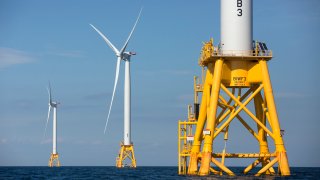
What to Know
- New Jersey lawmakers are considering letting Danish offshore wind developer Orsted keep tax credits that it otherwise would have to return to ratepayers.
- A state Senate panel advanced a bill Tuesday that would allow Orsted to keep federal tax credits to help counter what they termed lingering economic effects from the COVID-19 pandemic and elevated inflation.
- The state Ratepayer Advocate says the bill could increase costs for consumers, but Orsted denies that is the case. A final vote on the bill could come on Friday.
New Jersey lawmakers are considering letting Danish offshore wind developer Orsted keep tax credits that it otherwise would have to return to ratepayers.
A state Senate committee approved a bill Tuesday that would allow Orsted to keep federal tax credits to help counter what they termed lingering economic effects from the COVID-19 pandemic and elevated inflation. Amendments to the bill require Orsted to post a $200 million guarantee with the state, and prepare a report on the financial viability, possible environmental impacts and likelihood of finishing the project on time.
The federal 2022 Inflation Reduction Act is “designed to further spur investment in the American clean energy economy in the face of continuing macroeconomic challenges,” according to the bill, which was sponsored by Sen. Bob Smith, a Democrat from Middlesex County.
Get Philly local news, weather forecasts, sports and entertainment stories to your inbox. Sign up for NBC Philadelphia newsletters.
But the state's Ratepayer Advocate warned against passing the bill in its original form.
“While we support offshore wind, we have significant concerns about this bill, its impact on ratepayers, especially the costs and no protections for ratepayers, and the lack of accountability by the beneficiary of this bill,” Robyn Roberts, a spokesperson for the New Jersey Division of Rate Counsel, wrote to lawmakers.
Brian Lipman, the division's director, wrote, “There should be no doubt that this bill will increase the amount the developer earns on this project and will result in higher ... prices being paid by ratepayers. That is the inevitable result of this bill.”
Business
Orsted, which has state approval for two offshore wind projects off the southern coast of New Jersey, denied the bill would increase costs for customers.
“There’s no additional cost to ratepayers," the company said. "The Inflation Reduction Act increased the federal tax incentives and did so to create local investments into states like New Jersey. Orsted will increase its investments in New Jersey if the bill is enacted. These federal incentives present an opportunity for New Jersey to further secure in-state economic investments and hundreds of jobs at no additional cost to ratepayers.”
Orsted estimates the value of the credit would be 20 cents per month, or $2.40 per year per ratepayer, but did not estimate the company's total anticipated benefit.
“This is a gut-check moment,” said Tim Sullivan, CEO of the New Jersey Economic Development Authority. “Does New Jersey want to lead or be left out of the jobs and economic development? Other states want this just as badly as we do, if not worse. We have it within our grasp to be a leader.”
Sen. Michael Testa, a Republican, repeated calls from those in his party and in several residents' groups for a temporary pause on offshore wind development to see if it has any effect on a spate of at least 50 whale deaths on the East Coast since December.
“Why the rush?” he asked. “I have thousands of my constituents, and they're not climate deniers. They're not anti-science. They're not kooks. There's something amiss here.”
“Why would you give this money to Orsted when they already signed a contract and that money is obligated to go to ratepayers?” added Mike Dean, an offshore wind opponent.
Three federal scientific agencies and one state agency say there is no evidence that whale deaths are related to site preparation work for offshore wind projects.
At the request of U.S. Rep. Christopher Smith, the Congressional Accountability Office agreed to study the impact of offshore wind in the northeast.
Earlier this month, a think tank established by former state Senate President Steve Sweeney cautioned that offshore wind projects could be delayed by the rising costs of building the foundations for offshore wind turbines.
Orsted is the only company that would benefit from the bill. A third approved project, Atlantic Shores, is a joint venture between EDF Renewables North America and Shell New Energies US, but does not qualify under the state bill.
The bill would require Orsted to file an affidavit affirming that it will proceed with construction, and a schedule by which the company will make all its investments in wind energy facilities.
Madeline Urbish, an Orsted spokesperson, said the company anticipates receiving its federal approvals in the coming months and beginning construction on its first project in the fall.
Sign up for our Breaking newsletter to get the most urgent news stories in your inbox.



